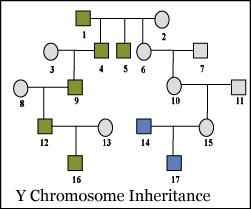Wednesday, October 03, 2007
DNA for the Genealogist
Lifted verbatim from the
Relative Genetics website -
Genealogists are interested in three main kinds of genetic testing: Autosomal, mitochondrial, and Y chromosome.
 Autosomal DNA are the 22 pairs of non-sex chromosomes found in the nucleus. Autosomal DNA testing will perform a scan throughout all your chromosomes to find the answer to your genealogical question. The benefits of autosomal testing are that you can verify/establish nuclear family relationships, there are no gender limitations, and you can test directly for a certain relationship, e.g. grandparent or sibling. The limitation of autosomal testing is that currently you can only test relationships as far back as the grandparent generation. The most popular application of autosomal testing is in determining paternity. (Extended Family Testing also uses autosomal analysis.)
Autosomal DNA are the 22 pairs of non-sex chromosomes found in the nucleus. Autosomal DNA testing will perform a scan throughout all your chromosomes to find the answer to your genealogical question. The benefits of autosomal testing are that you can verify/establish nuclear family relationships, there are no gender limitations, and you can test directly for a certain relationship, e.g. grandparent or sibling. The limitation of autosomal testing is that currently you can only test relationships as far back as the grandparent generation. The most popular application of autosomal testing is in determining paternity. (Extended Family Testing also uses autosomal analysis.)
Mitochondrial DNA (mtDNA) testing is conducted to determine information about your direct
 maternal line. MtDNA is maternally inherited meaning that a woman will pass her mtDNA to all of her children, but only her daughters will pass it to the next generation. The benefits of mtDNA are that sequencing can be used to determine if individuals share a direct maternal line and mtDNA haplogrouping can be used to determine an individual’s deep ancestral roots. The most popular application of mtDNA haplogrouping is in determining Native American ancestry. (For more information about these procedures see Biology 201.) The limitations of mtDNA testing are that you are restricted to direct maternal line testing, and that deep-rooted ancestry information gained from the haplogroup test, is not traditionally genealogically valuable.
maternal line. MtDNA is maternally inherited meaning that a woman will pass her mtDNA to all of her children, but only her daughters will pass it to the next generation. The benefits of mtDNA are that sequencing can be used to determine if individuals share a direct maternal line and mtDNA haplogrouping can be used to determine an individual’s deep ancestral roots. The most popular application of mtDNA haplogrouping is in determining Native American ancestry. (For more information about these procedures see Biology 201.) The limitations of mtDNA testing are that you are restricted to direct maternal line testing, and that deep-rooted ancestry information gained from the haplogroup test, is not traditionally genealogically valuable.Y chromosome testing is the most widely used application of genetics in genealogy. The Y chromosome is passed practically unchanged from father to son,
 generation after generation. Therefore, it is an ideal candidate for genealogical testing as in most western cultures the Y chromosome follows the same path as the surname. Thus, direct paternal descendents of a common ancestor will have the same or similar Y chromosome. The Y chromosome test can verify current genealogy and establish direct paternal links in the absence of written information. The limitations of Y chromosome testing are that any female interruptions in the line will negate the test and the specific relationship of the individuals tested cannot be established. (For more information, see Y-Chromosome Markers.)
generation after generation. Therefore, it is an ideal candidate for genealogical testing as in most western cultures the Y chromosome follows the same path as the surname. Thus, direct paternal descendents of a common ancestor will have the same or similar Y chromosome. The Y chromosome test can verify current genealogy and establish direct paternal links in the absence of written information. The limitations of Y chromosome testing are that any female interruptions in the line will negate the test and the specific relationship of the individuals tested cannot be established. (For more information, see Y-Chromosome Markers.)

0 Comments:
Post a Comment
<< Home